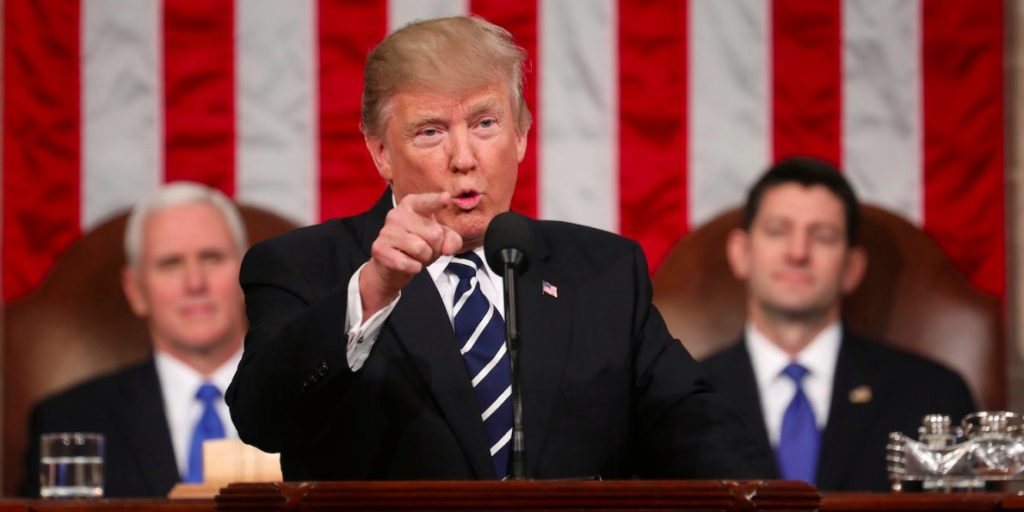Editor’s note. This is a nice synopsis alluding to the American System of Economics which the administration’s trade team seems to be returning to. Hamilton and Frederich List (German) dismissed Adam Smith as a cosmopolitan economist. See Michael Stumo’s speech to the Jessie Helms Center annual conference on the same topic here.
President Trump defended his use of tariffs to force other countries to renegotiate “unfair” trade deals by claiming that “our country was built on tariffs.” He’s right.
[Jeffrey Bartash | August 16, 2018 | MarketWatch]
President Trump defended his use of tariffs to force other countries to renegotiate “unfair” trade deals by claiming that “our country was built on tariffs.” He’s right.
America was a staunchly protectionist country for most of its history before World War II. One of the very first bills new President George Washington signed, for instance, was the Tariff Act of 1789. He inked the bill on July 4 of that year.
The tariff of 1789 was designed to raise money for the new federal government, slash Revolutionary War debt and protect early-stage American industries from foreign competition.
Then, as now, some industries sought protection in Congress from a flood of imports. Most goods entering the U.S. were subjected to a 5% tariff, though in a few cases the rates ranged as high as 50%.
It was the first of many tariffs that Congress passed over a century and a half. They generated the vast majority of federal revenue until the U.S. adopted an income tax in 1913. In some years tariffs funded as much as 95% of the government’s annual budget.
Tariffs have always been a source of controversy, however, starting with that very first one.
Early on, the North preferred higher tariffs to protect infant American industries such as textiles from established English manufacturers. Alexander Hamilton, the nation’s first Treasury secretary, feared the U.S. would remain a weakling unless it built its own industries and became economically independent of the mother country.
Over time the arguments on behalf of protectionism became closely tied to the emerging Republican party.
“Give us a protective tariff and we will have the greatest nation on earth,” a young politician named Abraham Lincoln said in 1847. Later, as the country’s 16th president, Lincoln rejected free trade and jacked up tariffs during the Civil War to pay for the North’s military campaigns.
The South opposed high tariffs long before the Civil War. Southerners wanted lower rates because they bought a lot of European goods for their homes, farms and personal habits. They came to resent tariffs as a transfer of wealth from South to North.
The discord between the two regions over tariff rates naturally intensified over time. The so-called Tariff of Abominations, for example, almost led to violent conflict between the federal government and South Carolina in 1832. And the long-simmering dispute later contributed to the split that led to the Civil War.
Tariffs began to decline in importance after the income tax went into effect in 1914, but the sea change in how Americans viewed tariffs didn’t take place until the Great Depression.
The infamous Smoot-Hawley tariff of 1930 came to be seen as a disastrous policy that spurred other nations to erect tit-for-tat trade barriers and exacerbated the global depression. By the middle of the decade, the administration of Franklin D. Roosevelt began to undo the damage.
By the end of World War II, tariffs largely lost favor in Washington. Republican fervor for free markets supplanted their protectionist legacy and Democrats hewed to their traditional support for low tariffs — at least until foreign competition began to make big inroads in the U.S. starting in the 1970s.
The postwar switch was probably inevitable. The once-puny U.S. economy had become a colossus, and American companies dominated the international stage. The economics profession had also come to widely reject protectionism as a valid tool to boost growth.
For the next 60 years the U.S. pushed to lower trade barriers, create a create a global system of free trade and flood the world with American goods.
Has the system fallen apart? Are other countries playing unfair? Is Trump right to resort to tariffs to try to restore a level playing field?
Those questions and more have revived long-dormant disputes in the U.S. about the role of tariffs. Trump is right that tariffs helped build America in the past, but it remains to be seen whether modern-day tariffs lead to an outcome that helps — or harms — America in the future.













